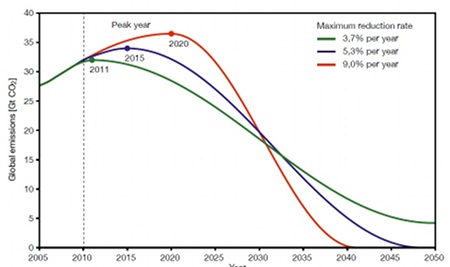Alexander on Why COP17 Was Depressing
Kaitlin Alexander writes in her ClimateSight blog about just why the result that came out of the recent COP17 meeting in Durban was so depressing: What Happened At Durban?
At COP15 in Copenhagen, countries agreed to limit global warming to 2 degrees Celsius. The German Advisory Council on Global Change crunched the numbers and discovered that the sooner we start reducing emissions, the easier it will be to attain this goal. This graph shows that if emissions peak in 2011 we have a “bunny slope” to ride, whereas if emissions peak in 2020 we have a “triple black diamond” that’s almost impossible, economically. (Thanks to Richard Sommerville for this analogy).
The thing is, even the early-peak slope isn’t exactly the sort of thing you want to try to negotiate your first time on skis. A 3.7% annual reduction in global carbon output would be unprecedented and difficult. 9% per year just isn’t going to happen, as far as I can see.
That’s why the Durban outcome was so depressing: It represents an agreement to collectively close our eyes and repeat fervently, “I do believe in fairies. I do! I do!”
I do not believe in fairies. I do believe, however, that by pretending to enable collective action that can limit warming to 2C, Durban helped to ensure that our grandchildren and great-grandchildren inherit a world with 4C warming and beyond.


December 17th, 2011 at 4:49 am
Just so you know, I’m helping. I’ve been tasked to buy software that will figure the carbon footprint as I design a product. I am fkrmly committed to someday putting that on my todo list
December 20th, 2011 at 11:11 am
I head a pretty good and simple debate (albeit a very unscientific one) with a friend the other day on this matter. He said he doesn’t think human activity could cause something as big as our climate to change.
After pointing out that 7 billion people is whole lot of people and that our activities would most certainly affect our planet I ended up winning him over with a simple point:
We both grew up reading National Geographic magazine. We learned SO much from it. And later on with the dawn of satellite television the NG Channel has pretty much been my default channel.
The good folks at National Geographic say AGW is real and it’s a problem. They’ve been studying it for years.
My friend has finally seen the light.
December 20th, 2011 at 12:00 pm
NL, thanks for trying to make me see the light. Yes, 7 billion peeps has enormous impact, we should do lots to prevent our impact on climate change, but I remain agnostic.
As for National Geographic, they put on a good show and are great illustrators but they are not smart. So as not to use space explaining, here are two critiques of their productions that caused them to lose my respect: http://911research.wtc7.net/reviews/NationalGeographic/#feature
http://911research.wtc7.net/reviews/NationalGeographic/#feature
I’m fine with agreeing to disagree here and leave this thread for shcb and jbc if they care to continue.
December 20th, 2011 at 12:01 pm
The second one:
http://www.911review.com/articles/ryan/NationalGeographicApology.html
December 21st, 2011 at 11:09 am
knarly, so NG corrects itself when it’s wrong. That’s a good thing, isn’t it?
And even more reason for me to trust them and their work.
December 21st, 2011 at 2:34 pm
NL,
NG did not correct itself. That’s a bad thing.
Without proper context you couldn’t be expected to know that the second link was a sardonic commentary on why NG has no choice but to apologize for their errors and set the record straight in their soon to be released 911 update.
Sadly, the second NG 911 program did not contain any apology nor any of the information provided that shows their previous version to be false (e.g. even the NIST agreement that the buildings did not pancake was not mentioned to correct their former lengthy explanations about the supposed pancake collapses.)
Moving on, an item from that same link:
Now, back to the topic, you mentioned the “good folks at NG” came down supporting AGW. Was that the magazine, the tv channel or both?